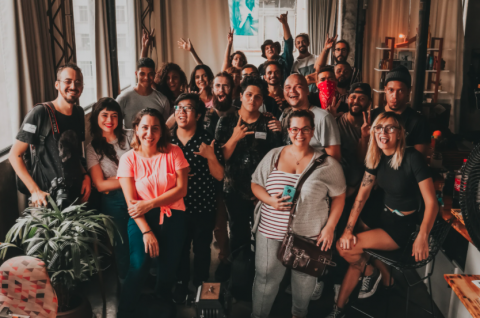How Honor Society Requirements Today Embrace Inclusivity
Oct 27,2020
In the world of academics, membership in an honor society is one of the most highly sought-after accolades. These honor societies can help students grow as people, grant them better job opportunities, and create cultures of academic curiosity and excellence. But in the past, these honor societies have not been open to all exceptional students.
Discrimination is an unfortunate part of honor society history, but many organizations today are working to change that. There’s more of a push to embrace inclusivity in honor societies in recent years. Read on to learn more about this history of discrimination and how it’s changing for the better.
What Are Honor Societies?
Before we dive into honor societies’ history with discrimination, let’s talk some about what makes an honor society. An honor society is an organization designed to recognize people in a group who have excelled in their field. Most often, this term refers to groups within the United States that honor people who have earned impressive academic achievements.
Honor societies may be based around a number of different criteria, depending on the group. Some will invite students who are within a top percentage of their class or who have achieved a certain grade point average to join. Others focus on students who maintain academic excellence while serving their communities in different ways.
History of Honor Societies
Honor societies have been a part of American academics since our country’s earliest beginnings. The nation’s oldest honor society, Phi Beta Kappa, was founded in 1776 at the College of William and Mary. It began as a social and literary organization, and in 1898, it reorganized as an honor society.
Other early honor societies include Tau Beta Pi (organized in 1885), Sigma Xi (organized in 1886), and Phi Kappa Phi (organized in 1897). The first honor society for women, Mortar Board, joined the ranks of academic prestige in 1918. Today, Phi Beta Kappa alone has more than half a million living members, and Phi Kappa Phi has about 100,000 active members.
Why They’re Important
So other than their impressive history, why are honor societies important in the modern world? For one thing, these organizations help bright, accomplished young people to form bonds with like-minded peers. These friendships can last a lifetime and can foster a culture of academic curiosity, growth, and service.
Honor societies can also be critical in helping students to find good jobs after graduation. Many employers look for these honors when reviewing resumes, and the right honor society membership can help an applicant stand out from a pool of resumes. High-level executives are likely members of honor societies themselves, and that connection can help current members gain a leg up in their careers.
Past Discrimination
However, for all their amazing qualities, honor societies have also had an ugly side in the past. Many of today’s most prestigious honor societies started as fraternities for rich, white, Christian men. Women were often not allowed to join, and people of color were almost never considered for membership.
In a system that only admitted white men of privilege, all those wonderful lifelong connections we mentioned earlier became tools for perpetuating discrimination. If a black woman and a white man applied for the same job, the white man’s honor society membership would work in his favor. The black woman wasn’t allowed to earn that accolade, even if she was every bit as intelligent and accomplished as the white man, and so she would be passed over for the position.
Continuing Systemic Bias
It may not surprise you to learn that this sort of systemic bias continues into our world today. The system that was designed to oppress people of color and women still runs in the same tracks it was built on. Even as of 2017, white men accounted for 72 percent of corporate leadership at sixteen Fortune 500 companies.
And the discrimination continues past the executive level today. White students tend to find more success in our academic systems than either black or Hispanic students. And for every dollar a white man makes, a white woman makes less than 80 cents, a black woman makes 62 cents, and a Hispanic or Latino woman makes just 54 cents.
How Honor Societies Can Perpetuate Discrimination
Unfortunately, honor societies can be an important tool for white patriarchal culture to perpetuate these systems of inequality. When the original members of those honor societies grew up and joined the corporate world, they became the leaders who decided which students got to join their honor societies. Naturally, they chose people who looked like them to join – rich, white, Christian men.
As the generations progressed, that same perpetuation of white male power continued. A recent study of a medical honor society, Alpha Omega Alpha, showed that more than 71 percent of members were white. Less than 1 percent were black, and less than 3 percent were Hispanic.
Dangers of Elitism
So why should we worry about elitism and discrimination in our honor societies? Some might argue that white students earn their places in honor societies fair and square, and if women or people of color want to join, they should step up their game. But aside from the complete ignorance this mindset shows for the issues of systemic racism, this sort of elitism is dangerous to everyone in our society.
As we move forward in an ever-more turbulent world, our nation needs strong, effective leaders. A leader cannot view the people they guide as less than; if they do, they begin to devalue the very people who they are supposed to protect. Elitism tells white men that their lives are worth more, and people who believe that way will strip away resources from the many to bolster the comfort of a few.
How Discrimination Can Manifest
While we have focused primarily on racism and sexism thus far, discrimination can manifest in a wide variety of forms. One of the more recent to come to light is discrimination on the basis of sexuality and gender identity. People who identify as lesbian, gay, transgender, bisexual, asexual, agender, or queer face much more discrimination than their straight, cisgender peers.
There is also a huge culture of discrimination against impoverished people in our culture. Our society may discriminate on the basis of hairstyle, dress, and body modification choices, especially if those choices have ties to ethnic heritage. And discrimination on all these fronts can be as subtle as microaggressions or as overt as denying entry into an honor society.
Why Inclusivity Is Important
Focusing on building inclusivity in our honor societies is one of the most powerful ways we can combat systemic racism and discrimination in our society today. Inclusivity is about more than improving diversity in your group. It’s about making minority groups of all sorts feel comfortable and welcome in your honor society.
When we promote inclusivity in our honor societies, we teach our young people that people of all identities have a place in high-achieving circles. They’ll come to expect that people of color, of all genders, and of all sexual identities can perform just as highly as anyone else. As these students rise to positions of leadership, they will pass this inclusivity along, slowly dismantling the systems of prejudice that have kept white straight men in power for so long.
Benefits of Being Inclusive
Inclusivity is about more than just damage control, however. It can have a long-term positive impact on honor societies and on our culture at large. For one thing, inclusive honor societies produce employees who are happier, more productive, and more well-rounded, which helps to improve their reputation among top-level employers.
Inclusive honor societies will also reap the benefits of a truly diverse culture. When you focus on inclusivity, you gain a wide variety of perspectives and experiences in your group. This can create more empathy and cultural intelligence among your members, as well as improving your problem-solving capabilities.
What Honor Societies Should Focus On
So what does a truly inclusive honor society look like? One of the first steps to achieving inclusivity is eliminating microaggressions in your society, especially in official honor society verbiage. Microaggressions are small, seemingly harmless statements or actions that show internalized bias.
Honor societies should also focus on intentionally promoting people of diverse identities into leadership roles. Greater diversity helps to improve inclusivity, especially when paired with efforts to recognize and eliminate microaggressions. And be sure to listen to your minority members – if they tell you something is a problem, take that seriously and take steps to resolve the issue.
How You Can Promote Inclusivity
Whether you are a member of or a leader in an honor society, there are steps you can take to improve inclusivity in your group. The first is something you’re already doing – learn about systemic and internalized bias and the importance of diversity and inclusivity. The more you know about systems of oppression that have existed in this country since its beginnings, the more you can recognize areas where you’re unwittingly helping to perpetuate them.
Also make efforts to make your personal circle more inclusive; the more diverse people you know, the less biased you will become. When given opportunities to recommend people or honors or promotions, try to recommend people of color or of different sexual or gender identities. And when you see microaggressions – or outright aggressions – happening against minority groups, use your privilege and speak out against them.
How to Fight Internalized Bias
As we mentioned, a huge part of breaking down systems of oppression is fighting internalized bias. We all have inherent biases that are the result of growing up in a society that’s dominated by white, straight, Christian men. It takes real work to discover and dismantle those internalized biases, but it’s a crucial step to creating a truly inclusive society.
Make an effort to make different perspectives a part of your daily information intake – follow people of color and of different sexual and gender identities on social media. If something they say makes you upset, take a step back, and examine why. And listen to your friends who are in minority groups when they tell you you’re showing a bias.
A Glimpse into the Future of Inclusive Honor Societies
So what will this beautiful future of truly inclusive honor societies look like? We can only guess, but if we achieve true inclusivity, we can expect our honor societies to become much more vibrant, beautiful places. Honor societies will be true beacons for celebrating excellence, no matter what form it comes in.
And the people who graduate from those honor societies will go on to make our workforce a better place to work for everyone. They will make more inclusive hiring decisions and be forces for eliminating microaggressions in the workplace. And as the cycle goes on, they will continue to make our honor societies better, more inclusive organizations.
Learn to Embrace Inclusivity
More and more honor societies these days are starting to embrace inclusivity, and for good reason. An inclusive society creates more empathetic, well-rounded members who can transform the world for the better. If you are a member of an honor society, think about what you can do to make your society a safer place for everyone.
If you’d like to learn more about the history and future of honor societies, check out the rest of our site at The Honor Society Museum. We are dedicated to preserving and enhancing the illustrious 200+ year history of honor societies. Check out our collection and discover the rich history of these prestigious organizations today.





